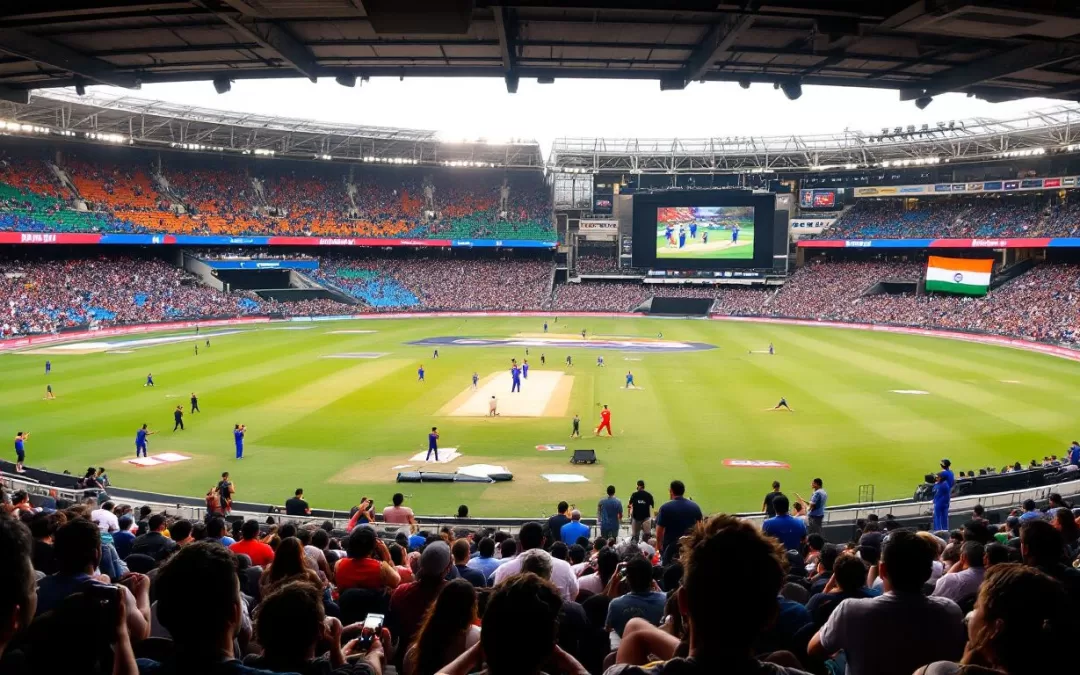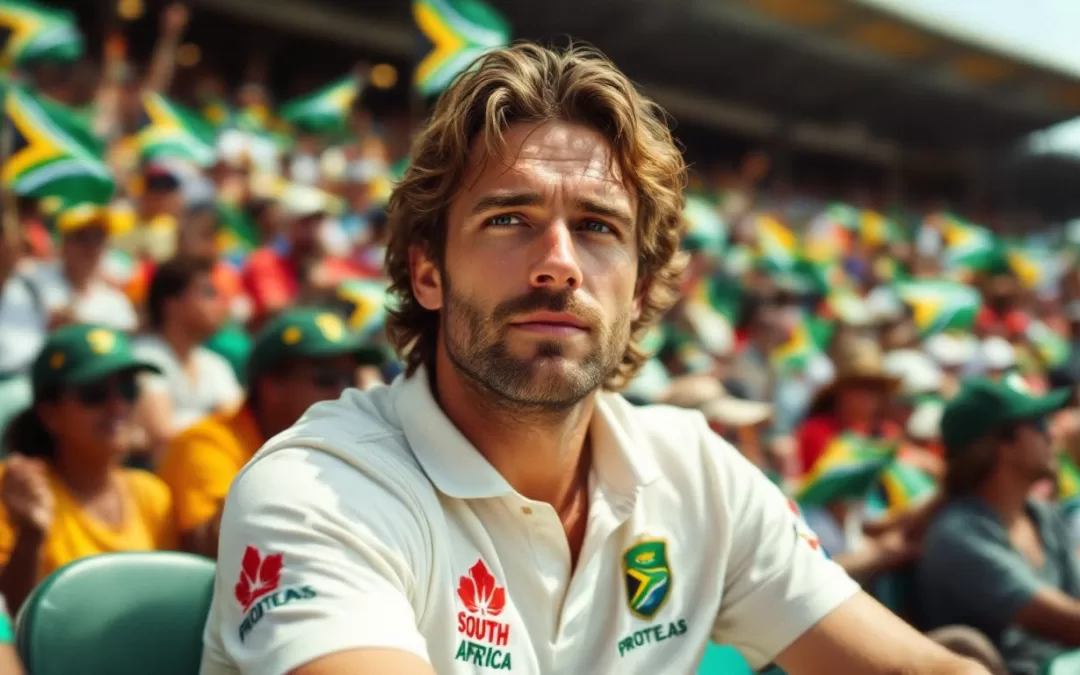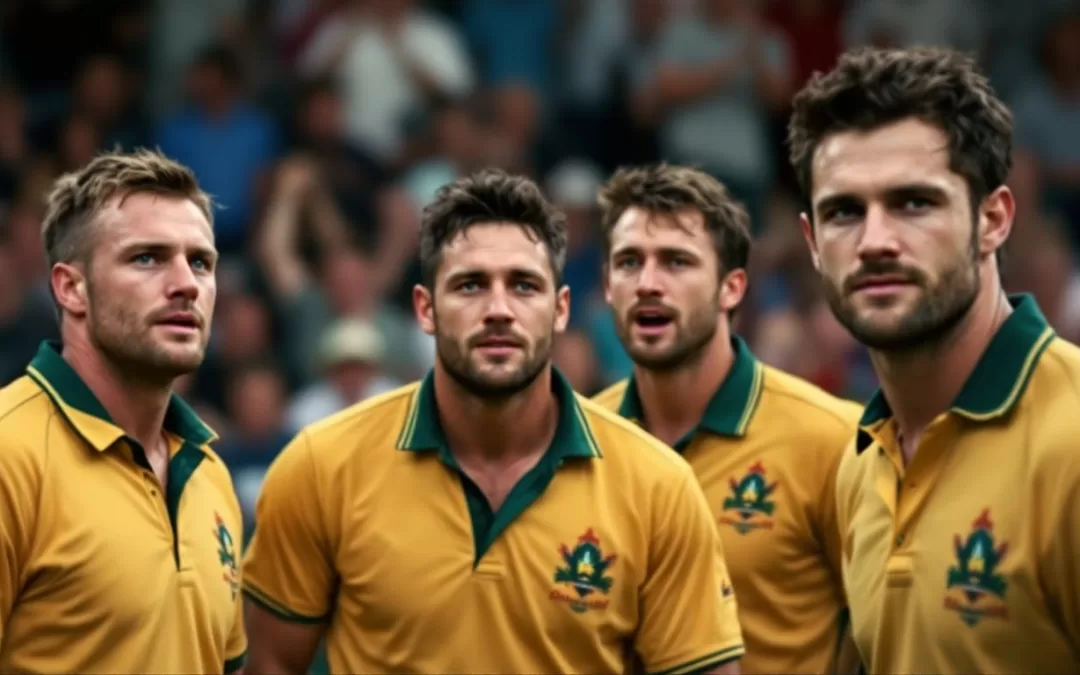Struggling to keep up with the ever-changing cricket scene in Pakistan? Cricket is more than just a sport here—it’s a passion deeply rooted in culture. This blog will give you a clear and simple breakdown of the Pakistan cricket team, from its history to its present-day achievements. Stick around—there’s plenty to learn!
Key Takeaways
- Pakistan’s cricket team started in 1952 with its first Test match against India. Fazal Mahmood played a key role, taking five wickets in that game.
- The team won the ICC ODI World Cup in 1992 under Imran Khan and the T20 World Cup in 2009. These are their major global wins.
- Babar Azam leads as captain across all formats. He is one of the top batsmen globally, with an ODI average above 58. Shaheen Afridi shines as a leading bowler with over 100 Test wickets.
- Domestic leagues like the Quaid-e-Azam Trophy and PSL shape future stars by developing red-ball skills and T20 expertise.
- Challenges include strong competition from nations like India and internal issues such as unstable management, impacting progress ahead of big tournaments like ICC events.
Importance of cricket in Pakistani culture
Cricket is like a heartbeat in Pakistan. Streets fill with kids playing this game daily. Match days spark national unity, with people gathering around screens everywhere.
Pakistan’s history ties deeply to cricket glory. The 1992 World Cup win brought pride to millions. Famous players, such as Imran Khan and Wasim Akram, are seen as heroes here.
Current status (e.g., recent achievements, rankings)
Pakistan’s cricket team ranks among the top in all formats. They are currently No. 1 in ICC ODI rankings as of September 2023.
Recent performances include a strong Asia Cup run, though they lost in the Super Four stage. Star players like Babar Azam and Shaheen Afridi shine, lifting team morale with consistent efforts.
Historical Background

The Pakistan cricket team began its journey in 1952 with its first Test match—marking the start of a rich history. Keep reading to discover key milestones and their rise to fame!
Founding and early years
Pakistan formed its cricket team in 1947 after gaining independence. The Pakistan Cricket Board (PCB) managed the team and quickly sought international recognition.
In October 1952, Pakistan played its first Test match against India in Delhi. This marked their entry into international cricket. Their early years saw talented players emerge, setting up the foundation for future success.
” > ‘Cricket is a passion here; it binds us together,’ said Fazal Mahmood, one of Pakistan’s first stars.
First Test match details (1952)
Pakistan played its first Test match against India on October 16, 1952. The match took place in Delhi at Feroz Shah Kotla Stadium.
Abdul Kardar led the team as captain. Fazal Mahmood stood out with his bowling skills, taking five wickets in the second innings. Despite their efforts, Pakistan lost by an inning and 70 runs.
This match marked the start of Pakistan’s journey in Test cricket history.
Key milestones in early history
The national cricket team of Pakistan has a rich and exciting history. It started strong with key events shaping its journey into international cricket.
- Pakistan’s cricket board was formed in 1948, just one year after the country’s independence.
- The team earned Test status in July 1952 from the International Cricket Council (ICC).
- Their first-ever Test match was played in October 1952 against India in Delhi.
- Fazal Mahmood starred during this early phase by taking 12 wickets to secure Pakistan’s first Test win over India in Lucknow later that same series.
- In 1954, Pakistan shocked England by securing their first Test victory on English soil at The Oval.
- Hanif Mohammad etched his name in history by scoring a marathon 337 runs against the West Indies in Barbados during 1958—marking one of cricket’s longest innings.
- The team rapidly gained recognition for producing skilled bowlers like Khan Mohammad and versatile batsmen such as Saeed Ahmed during its formative years.
Evolution of the team
Pakistan’s cricket team started strong after its Test debut in 1952. Early years saw great players like Fazal Mahmood shape the team’s identity. Over time, they refined their strategies and built a unique playing style.
Changes in leadership and management impacted performance. The introduction of talent from domestic leagues like the Quaid-e-Azam Trophy added depth to the squad. Transition to modern formats strengthened their standings globally…
setting up key milestones ahead.
Changes in team structure and management over the years
The Pakistani cricket team has seen many changes in its structure. Early years focused on raw talent, but training and strategy improved over time. The Pakistan Cricket Board (PCB) introduced stricter rules for player fitness and discipline in recent decades.
Captains, coaches, and selectors shifted often. Some periods had stability, while others faced frequent replacements. Domestic leagues like the Pakistan Super League now play a bigger role in selecting players for the national team.
Modern coaching staff includes data analysts to improve performance across formats like Test cricket and T20 matches.
Major Achievements
Pakistan’s cricket team has won global titles and earned its place as one of the top teams—read on to discover their historic successes!
World Cup success
Pakistan won the ICC Cricket World Cup in 1992. The team, led by Imran Khan, defeated England in the final. This victory remains their only ODI World Cup title.
In T20 cricket, Pakistan claimed the ICC T20 World Cup in 2009. They beat Sri Lanka to secure their second major global trophy. These wins cemented Pakistan’s legacy in international cricket history.
Overview of ICC Cricket World Cup victories (1992)
The Pakistani cricket team won its first ICC ODI World Cup in 1992. Led by Imran Khan, they defeated England in the final held in Melbourne. The team scored 249 runs and restricted England to 227, winning by 22 runs.
Notable players like Javed Miandad, Wasim Akram, and Inzamam-ul-Haq played key roles. Wasim Akram stood out with his fierce bowling and crucial wickets in the final match. This victory remains one of Pakistan’s greatest achievements in international cricket history.
Test cricket achievements
After winning the 1992 World Cup, Pakistan excelled in Test cricket. Their first ICC World Test Championship victory came against Australia in 2021. Pakistan has also won memorable series like the 1987 win over India and a clean sweep of England in the UAE during 2012.
Legends have left their mark on Tests. Wasim Akram’s lethal bowling earned him fame, while Younis Khan scored over 10,000 runs in this format. Babar Azam continues to shine as one of today’s top batters with consistent performances across formats.
ICC World Test Championship titles and notable series victories
Pakistan has had great moments in Test cricket. Their journey in the ICC World Test Championship (WTC) builds on their history of strong performances.
- Pakistan joined the first ICC WTC in 2019–2021 but did not reach the final. They ranked 6th with 286 points, winning four matches out of 12.
- The team showed improvements in the second WTC cycle (2021–2023). They competed hard but finished 7th, managing only four wins and three draws.
- Notable Test series victories include defeating England in their home conditions in 1987, winning the series 1-0. Imran Khan led the team during this historic triumph.
- In 1994, Pakistan secured a famous victory against Australia in Karachi. They defended just seven runs to win by one run, thanks to Mushtaq Ahmed’s bowling.
- The team won its first-ever Test series against India on Indian soil in 1987 under Imran Khan’s captaincy. This is still considered one of their greatest achievements.
- In more recent notable Tests, they beat Sri Lanka away from home in dramatic style during the Galle Test match of July 2022, chasing down a target of 342 runs.
This legacy inspires Pakistan to aim higher as they focus on global tournaments next!
T20 International highlights
The team shined in the 2009 ICC T20 World Cup, winning the title against Sri Lanka. They remain one of the most consistent teams in T20 history, reaching multiple semifinals and finals.
Key players like Babar Azam and Shaheen Afridi lead from the front with exceptional performances. The squad’s aggressive approach often puts them among top-ranked T20 cricket teams worldwide.
Participation and performance in T20 World Cups
Pakistan has a strong history in T20 World Cups. The team’s performance often shows its skill and passion for cricket.
- Pakistan played the first T20 World Cup in 2007. The team reached the final but lost to India.
- In 2009, Pakistan won the T20 World Cup by defeating Sri Lanka in the final. It was their first victory in this format.
- In 2010, they made it to the semi-finals but were beaten by Australia in a close match.
- During the 2012 tournament, they reached the semi-finals again before losing to Sri Lanka.
- Their performance dipped in 2014 as they failed to qualify for the semi-finals.
- In 2016, Pakistan struggled and exited early during group stages.
- The team showed improvement in 2021, reaching the semi-finals but losing to Australia.
- During the 2022 edition, Pakistan made it to the final yet fell short against England.
Pakistan is known for producing star players like Babar Azam and Shahid Afridi who shine on big stages like these tournaments!
Key Players and Legends
Pakistan has produced some of cricket’s greatest players. From past legends to current stars, they’ve shaped the team’s legacy with skill and passion.
Historical icons
Imran Khan led Pakistan to its first ODI World Cup win in 1992. He was known for his leadership and all-round skills. Wasim Akram earned fame as a fast bowler with over 900 international wickets, becoming a legend in cricket history.
Javed Miandad played one of the most famous innings in cricket—a last-ball six against India in 1986. His consistency made him one of the best batsmen of his time. Each player shaped the team’s strong legacy globally.
Profiles of legendary players (e.g., Imran Khan, Wasim Akram, Javed Miandad)
The Pakistani cricket team has a history of legendary players. These stars changed the game with their skills and leadership.
- Imran Khan
- Led Pakistan to its first ODI World Cup victory in 1992.
- Played 88 Test matches, scoring 3,807 runs and taking 362 wickets.
- Known for his all-rounder abilities and strong captaincy.
- Wasim Akram
- Took 916 international wickets, making him one of the best bowlers ever.
- Mastered swing bowling, earning the nickname “Sultan of Swing.”
- Was part of the winning squad in the 1992 World Cup.
- Javed Miandad
- Played 124 Test matches and scored over 8,800 runs.
- Famous for his last-ball six against India in the Austral-Asia Cup final (1986).
- Regarded as one of Pakistan’s greatest middle-order batsmen.
Current stars
Babar Azam leads the team as captain and star batter. He is ranked among the world’s best in both ODI and T20 formats. Shaheen Afridi, a left-arm fast bowler, dominates with his pace and swing.
His early breakthroughs often change matches.
Mohammad Rizwan shines as a reliable wicketkeeper-batter. He has been critical in T20s with consistent runs at the top. Shadab Khan excels as an all-rounder, offering leg-spin and strong lower-order batting.
These players drive Pakistan’s current success on the global stage.
Overview of current key players (e.g., Babar Azam, Shaheen Afridi)
Babar Azam, the captain of Pakistan’s cricket team, is one of the best batsmen in the world. He has a batting average above 50 in both ODIs and T20 matches. His calm leadership and consistent runs have kept Pakistan competitive on the global stage.
Shaheen Afridi leads the bowling attack with his left-arm pace. Known for swinging deliveries at high speeds, he was crucial in Pakistan’s performances during recent ICC tournaments.
His ability to take early wickets makes him a dangerous bowler across all formats.
Team Structure and Management
The Pakistan cricket team has a strong squad, led by skilled players and managed by experienced coaches—click to explore more!
Current squad overview
Babar Azam leads the national team as captain in all formats. Shaheen Afridi, a star bowler, strengthens the squad with his pace and skill.
The current lineup includes Fakhar Zaman, Imam-ul-Haq, and Mohammad Rizwan as key batsmen. Bowlers like Haris Rauf and Shadab Khan provide balance in ODIs and T20s. Young players are stepping up to secure future wins.
Captaincy and coaching staff details
The Pakistan cricket team captain is Babar Azam. He leads in all three formats—Tests, ODIs, and T20s. Under his leadership, the team has improved rankings and delivered strong performances in global tournaments.
The head coach is Grant Bradburn. He focuses on strategy and player development. The coaching staff includes batting coach Andrew Puttick and bowling coach Morne Morkel. They ensure skills training remains consistent across formats.
Domestic structure
Coaching decisions often link to domestic success. Pakistan’s domestic structure builds talent via tournaments like the Quaid-e-Azam Trophy and Pakistan Super League (PSL). These events create a pool of skilled players for the national team.
The PSL attracts international stars while boosting local players’ exposure. The Quaid-e-Azam Trophy focuses on red-ball skills, vital for Test cricket. Both formats ensure consistent player development across all game types.
Explanation of how domestic leagues contribute to the national team (Quaid-e-Azam Trophy, Pakistan Super League)
The Quaid-e-Azam Trophy produces skilled Test players. It sharpens techniques and builds patience for long matches. Domestic teams face strong opponents, preparing athletes for international cricket challenges.
The Pakistan Super League grooms T20 stars. Players adapt to high-pressure situations and global competition. This league also exposes them to international talent, improving their skills further.
Recent Performance Analysis
Pakistan’s recent cricket matches showed mixed results. Some players shined, while others struggled to find form.
Recent series results
Pakistan played a thrilling ODI series against Sri Lanka in September 2023. They won the series 2-1, showing strong performances from both batters and bowlers. Babar Azam led well with consistent runs, while Shaheen Afridi impressed with early breakthroughs.
In August 2023, Pakistan dominated Afghanistan in a three-match ODI series. They swept it 3-0, thanks to Fakhar Zaman’s solid half-centuries and Haris Rauf’s fiery spells. These wins helped improve their ICC rankings before the World Cup.
Summary of recent matches and series outcomes
The Pakistani cricket team recently played a Test series against Sri Lanka in July 2023. They won both matches, securing a 2-0 victory. This performance boosted their ICC Test rankings.
In the Asia Cup 2023, Pakistan reached the Super Four stage but lost to India and Sri Lanka. Babar Azam’s batting was strong in earlier matches, while Shaheen Afridi impressed with key wickets.
Player performance metrics
Player performance metrics showcase key stats across formats. These include batting and bowling averages, strike rates, and recent form indicators. Metrics often define player roles and their value in the team.
| Player | Format | Matches | Runs | Batting Avg | Strike Rate | Wickets | Bowling Avg |
|---|---|---|---|---|---|---|---|
| Babar Azam | ODI | 108 | 5,409 | 58.81 | 89.04 | – | – |
| Shaheen Afridi | Test | 27 | 180 | 6.92 | 54.10 | 105 | 25.17 |
| Mohammad Rizwan | T20I | 85 | 2,755 | 48.33 | 126.55 | – | – |
| Haris Rauf | T20I | 61 | 55 | 5.50 | 91.66 | 87 | 21.69 |
| Imam-ul-Haq | ODI | 68 | 3,647 | 52.10 | 82.26 | – | – |
Statistical analysis of player performances in various formats
The team’s performance data reveals key insights across formats. Here’s a breakdown of players’ contributions using statistical metrics:
| Player | Format | Matches | Runs | Batting Average | Wickets | Bowling Average |
|---|---|---|---|---|---|---|
| Babar Azam | ODI | 109 | 5,440 | 58.16 | – | – |
| Babar Azam | Tests | 49 | 3,696 | 48.05 | – | – |
| Babar Azam | T20I | 104 | 3,275 | 41.48 | – | – |
| Shaheen Afridi | ODI | 44 | – | – | 97 | 22.61 |
| Shaheen Afridi | Tests | 27 | – | – | 105 | 24.86 |
| Shaheen Afridi | T20I | 58 | – | – | 75 | 22.63 |
| Fakhar Zaman | ODI | 73 | 3,193 | 47.79 | – | – |
| Mohammad Rizwan | T20I | 85 | 2,897 | 50.84 | – | – |
Numbers highlight consistency and skill levels. Performances like Babar’s ODI average of 58.16 reflect his dominance. Shaheen’s bowling figures stand out in all formats.
Challenges and Future Prospects
The team faces tough competition from stronger cricketing nations. Future tournaments will test their skills and player development plans.
Challenges facing the team
Pakistan’s cricket team faces stiff competition from global teams like India, Australia, and England. Inconsistent performances in major tournaments add pressure.
Internal issues, such as unstable leadership or frequent coaching changes, disrupt focus. Limited exposure to international matches at home affects player development.
Discussion on competition from other nations and internal challenges
Teams like India, Australia, and England often challenge Pakistan’s cricket team on the field. Their consistent performances and strong domestic systems make them tough competitors.
Rising teams like Afghanistan add pressure with emerging talents.
Internally, unstable management and frequent changes in coaching staff hurt progress. Player injuries also disrupt consistency. Domestic leagues like the Quaid-e-Azam Trophy need better planning for talent growth.
These issues impact preparation for events—bringing us to future prospects.
Future outlook
Pakistan’s cricket team has strong potential in all formats. Young skilled players like Shaheen Afridi and Babar Azam drive chances for success.
Upcoming tournaments, like the ICC World Cup, are key tests. Improved coaching and domestic leagues may boost player growth.
Predictions for upcoming tournaments and player development
The team will likely focus on solidifying its top order, relying on players like Babar Azam and Imam-ul-Haq for stability. With Shaheen Afridi leading the bowling attack, young talents such as Naseem Shah could shine in upcoming tournaments.
Pakistan cricket board may continue grooming emerging players through events like the Pakistan Super League. This approach can improve depth in batting and bowling. Increased fielding practice is expected to address past weaknesses ahead of major competitions, including future World Cups and ICC tournaments.
Fan Engagement and Cultural Impact
Pakistani cricket fans are passionate, bringing unmatched energy to matches—discover more about their influence!
Fan base and support
Pakistan’s cricket fans are known for their passion. Millions watch games in stadiums, on TV, and online. Cricket unites people from all parts of the country.
Social media boosts this connection. Platforms like Twitter and Instagram offer updates, memes, and debates about matches. Sponsorships and media deals keep cricket in the spotlight daily.
Description of the fan culture surrounding Pakistani cricket
Fans of the Pakistani cricket team are passionate and devoted. Cricket matches often fill stadiums with loud cheers, waving flags, and fans dressed in green. Streets erupt with celebrations after big wins, including fireworks and parades.
Social media buzzes during games with updates and opinions from millions. Public spaces like tea shops air matches on TV for groups to watch together. Fans idolize players like Babar Azam and Shaheen Afridi, turning them into national heroes.
Some even offer prayers for victories before important games.
Media coverage and sponsorships
Media coverage boosts cricket’s popularity in Pakistan. Major networks like PTV Sports and Ten Sports air matches, drawing millions of viewers nationwide. Social media platforms engage fans with live updates, interviews, and highlights.
Sponsorships play a key role in funding the national team. Companies like PepsiCo and HBL sponsor jerseys, tournaments, and domestic leagues like PSL. These partnerships bring money while promoting brands to global audiences during international matches.
Impact of media on cricket popularity in Pakistan
TV channels broadcast every big match. Social media spreads highlights and updates fast. Platforms like YouTube show live matches, player interviews, and behind-the-scenes clips. News websites report match results and rankings daily.
Sports shows debate cricket strategies and team performance. Ads feature star players to attract fans. Pakistan Super League gained fame due to heavy online buzz and TV coverage. These efforts keep the sport popular across all age groups in Pakistan.
Conclusion
The Pakistan cricket team holds a vital place in international cricket. Their journey continues to inspire and excite fans worldwide.
Summary of key points discussed
Pakistan’s cricket history is rich. The team debuted in Test cricket in 1952, marking its start on the global stage. Over decades, it evolved with iconic players like Imran Khan and Wasim Akram shaping its success.
Major achievements include winning the ODI World Cup in 1992 and performing well in T20 tournaments. Current stars like Babar Azam lead a competitive squad today. Recent performances show improvement, but internal challenges remain.
Next is exploring Pakistan’s historical beginnings further.
Final thoughts on the significance of the Pakistan Cricket National Team in global cricket
The Pakistan cricket team has shaped global cricket with its talent and passion. It is known for producing stars like Imran Khan, Wasim Akram, and Babar Azam. These players inspire fans worldwide with their skills.
Major wins, like the 1992 World Cup, highlight Pakistan’s impact on international matches. Their unpredictable playing style excites audiences in every format—Test, ODI, or T20. The team’s influence extends beyond games by uniting a massive fan base across the globe.
FAQs
1. What is the Pakistan cricket national team known for?
The Pakistan cricket national team is known for its unpredictable performances, strong bowling attack, and passionate fan base.
2. When did Pakistan win the Cricket World Cup?
Pakistan won the Cricket World Cup in 1992 under the leadership of Imran Khan.
3. Who are some famous players from Pakistan’s cricket history?
Famous players include Wasim Akram, Waqar Younis, Javed Miandad, Shahid Afridi, and Babar Azam.
4. How does the team perform in international tournaments?
Pakistan has been successful in major events—winning ICC trophies like the Champions Trophy (2017) and T20 World Cup (2009). Their performances often depend on consistency and teamwork.












0 Comments